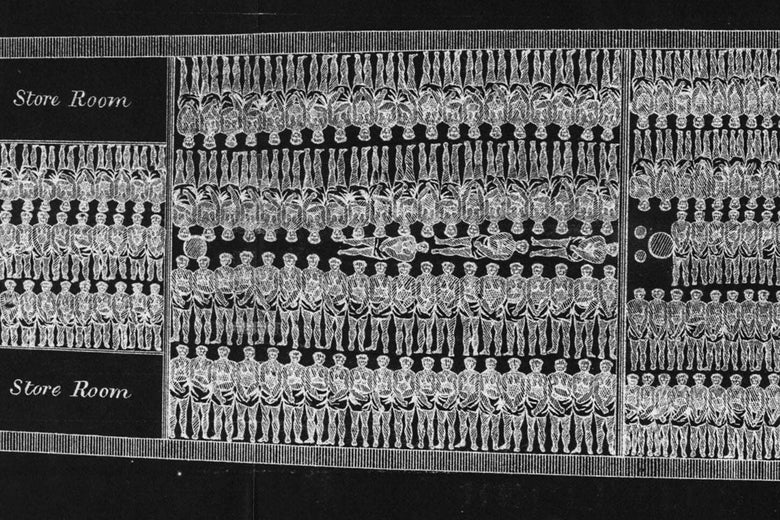
Stowage of the British slave ship Brookes under the Slave Trade Act of 1788.
Library of Congress
In 2015, when Jamelle Bouie and I started thinking of putting together a podcast series on the history of American slavery, it had been one year since the protests in Ferguson, Missouri; two years since Black Lives Matter hashtags began appearing across social media platforms; and three years since Trayvon Martin died in Florida. Black history felt vital, present, everywhere. So we embarked on telling the story of American slavery and its historical injustice by looking at the lives of nine enslaved people, then exploring how the institution came to shape our country’s politics, economy, and culture.
Putting together this series, I often felt cognitive dissonance as I swung between sorrow brought on by immersion in this history of human cruelty and suffering, and appreciation of the many richly researched and well-argued books on the topic that have come out in the past few decades. And although we got some pushback from the usual suspects deploying the usual tired arguments, the otherwise positive response to the podcast reassured me that Bouie and I managed to convey something of the depth of the history we encountered during our research. After all our agonized decisions about what to include and what must, for the sake of time, be glossed over, I felt satisfied that we got something basic across: The history of slavery is complex, it’s inextricably embedded in American history, and it matters.
Then, a year after we finished the series, Donald Trump was elected president, and the voices of the worst racists and history deniers in the country got a megaphone. It feels like every day, somebody with a big media presence or a presidential pardon says something deliberately ignorant about slavery, the Confederacy, or civil rights.
Last year, we marked 400 years since the first enslaved Africans came ashore at Jamestown in 1619. Two of our nation’s biggest newspapers have produced weighty packages on the continuing meaning of slavery in American life (Jamelle has an essay in that one!) and on the teaching of slavery in American schools. But these big efforts to bring the history of slavery into public conversation have met with renewed resistance. In the past few months, the 1619 Project has become the catalyst for a new debate that’s about historiography, on its face, but also about the very foundations of American society and culture.
To which I say only: Let’s keep flooding the zone. The history of slavery in the colonies that became the United States still shadows our everyday lives; as the 1619 Project argued, slavery is the backstory to every contemporary issue in American society—income inequality, housing, health care, culture, even climate justice. We reissue Slate’s History of American Slavery podcast now as a way of adding our own voices to the commemorative chorus, and insisting that this anniversary shouldn’t pass unremarked. We hope that you enjoy it.
Get More of the History of American Slavery Podcast
Slate Plus members get extended, ad-free versions of our podcasts—and much more. Sign up today and try it free for two weeks.
Subscribe to The History of American Slavery
Copy this link and add it in your podcast app.
For detailed instructions, see our Slate Plus podcasts page.
Also: Listen to Rebecca and Jamelle’s follow-up podcast on Reconstruction.
from Slate Magazine https://ift.tt/2RNGZTK
via IFTTT
沒有留言:
張貼留言